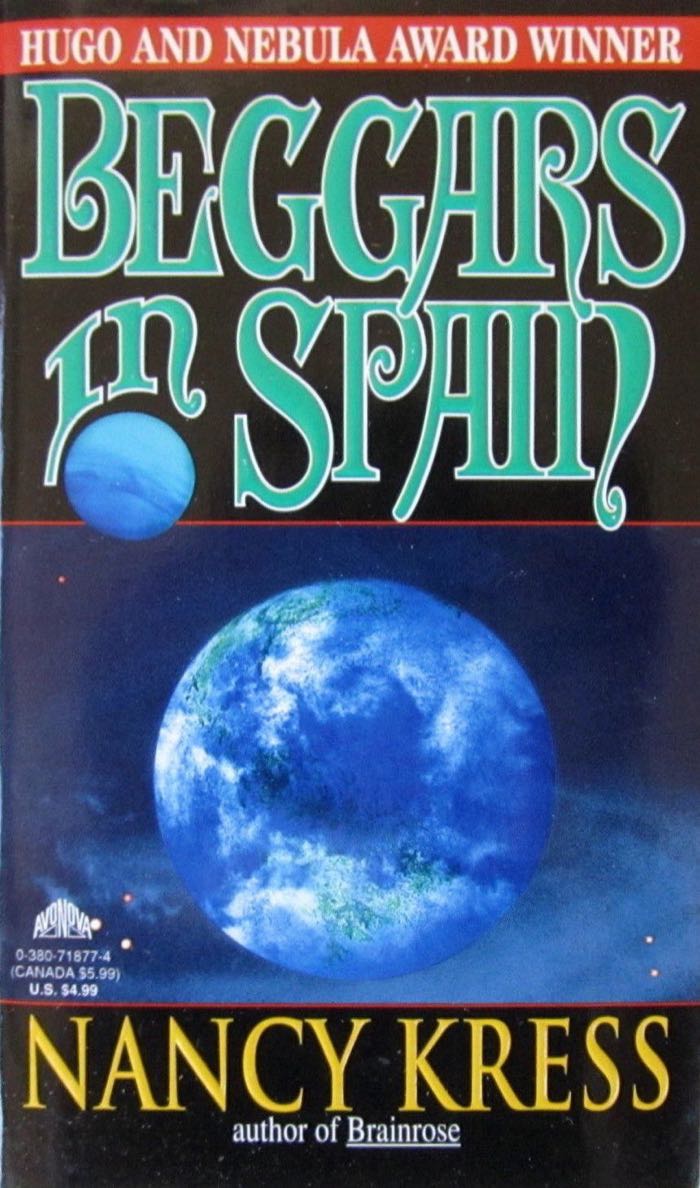Beggars in Spain
Reviewed date: 2005 Jan 18
Rating: 4
438 pages
Plot: Leisha Camden is one of the first in a new generation of genetically enhanced humans. She is mentally stable, intelligent, driven, and does not require sleep. The superiority of Leisha and the other Sleepless causes the rest of humanity, the Sleepers, to hate them. The hate is slow at first, starting with resentment at the unfair advantages the Sleepless have over Sleepers. The division soon grows so bad that the Sleepless withdraw from society, forming their own refuge which they call Sanctuary. When the United States threatens Sanctuary's economic survival with draconian taxes and legal restrictions, the world comes to the brink of war.
Structure: The novel is divided into four sections. The first follows Leisha from childhood into her young adult years, chronicling the development of the world's hatred for the Sleepless, and the development of the Sleepless community. This is the highlight of the novel; it is the novella from which the novel was spun.
After the excellent first section, the next three drop off rapidly in quality. The second is dominated by a court case that will set precedent for how Sleepless are treated in a world still dominated by Sleepers. The third meanders around, drops Leisha as a main character, and finally focuses on the social and scientific experiments happening in the Sleepless community. The fourth section, clearly the weakest, abandons the precepts and framework created by the previous three, and features an uninspired showdown between the Sleepless community and the United States.
Philosophy: Beggars in Spain prominently features an ethical framework called Yagaiism.
Spiritual dignity comes from supporting one's life through one's own efforts, and from trading the results of those efforts in mutual cooperation throughout the society. [The] symbol of this is the contract. [We] need each other for the fullest, most beneficial trade."
Yagaiism is Kress's fictional version of Ayn Rand's Objectivism. Throughout the book, Leisha Camden struggles to integrate Yagaiism with her human need to show compassion. Yagaiism works well when every man is strong and has something to offer in trade, but breaks down when a man is destitute, has no property and no skills, nothing to offer in trade. He is a beggar. There is no room in Yagaiism for beggars.
Kress starts off well by highlighting the strengths and weaknesses of Yagaiism. But in the latter half of the novel she falters, then suddenly and without warning discards the ideals of Yagaiism entirely. Now, you may not agree with Yagaiism (i.e., Ayn Rand's Objectivism) but it displays poor planning when a novel's central theme is abruptly discarded in the final few chapters.
Lies: The cover of the paperback version states in all caps: "HUGO AND NEBULA AWARD WINNER". This is a lie. The novella Beggars in Spain won the Hugo and the Nebula, but the full-length novel won no prizes. There is a reason for this: the novella is excellent, the novel average. I recommend the novel anyway, because it contains the novella (in a slightly modified form, naturally.) Go ahead, read the first section of the novel (that is, the novella.) If you're still interested, read the second section. Skip the last two sections, as they're not worth the read.
I rate Beggars in Spain a four on the strength of the first section. The remaining three sections get a rating of two.
